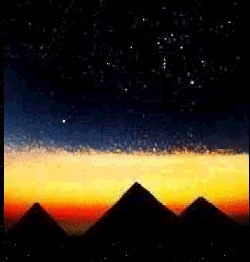Whatever the misty origins of human culture, what we do know about Sirius mythology comes from Ancient Egypt's reverence of this star. Thousands of years ago, the Egyptians noticed that the Nile flooded every year when the Sun lined up with Sirius. Since the floodwaters made the entire valley fertile, bringing sustenance, life, and stability, it only seemed natural to bless Sirius for this abundance. The highest ranking figures in Egypt's pantheon of Gods and Goddesses are all associated with Sirius, including Isis, Osiris, Horus, Hathor, Anubis, and Thoth.
In The Egyptian Book of the Dead, Sirius is described as the place where souls go
after they leave the body. Egyptian temples were oriented toward Sirius, and a calendar was created centered on the annual conjunction of the Sun with Sirius. Sirius represented, therefore, the religious concept of renewal as an extrapolation of the annual flooding. This included the idea of death and rebirth, ie. reincarnation, which the greatest pyramids are devoted to. More prosaically, Sirius is also the key to survival, the organization and use of time, and the successful management of civilization. The mythology of Sirius extends across our planet to include the empires of Greece, Persia, Rome, China, and the Mayans.
Sirius, as the astronomical foundation of the entire Egyptian religious system, as
well as many other ancient empires, carries profound metaphysical and esoteric meaning. If there exists an actual guiding intelligence to Earth's evolution, it most certainly can be associated with Sirius. And the United States, with its Sun conjunct Sirius, represents, therefore, the clearest channel for this extra-human agency to manifest its will, whatever that may be. For those who might assume that supernatural guidance is America's fate, it might be wise to recall that all empires have had an expiration date.
